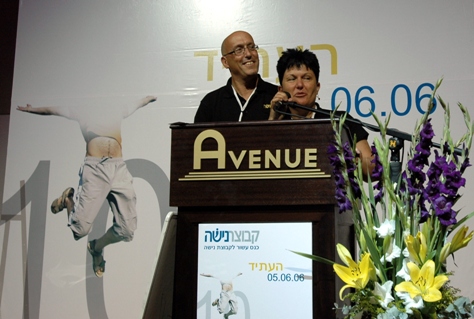Human Resources - Manage Your Interests With a Comprehensive View! / Hila Yaakobi
this is the message paule and menachem tzuker, founders and directors of the nisha group, want to convey. we met with them and with roi shiluach, the company's marketing director, for a conversation about the local employment market, especially in the field of high-tech, the world of job placement and recruitment and human resources management in israel. a talk full of ideas, revelations and worldviews, as well as reminiscences and a look toward the future.
what characterizes today's high-tech employment market?
paule: "the customer's demands for quality go up all the time. the problem is that the candidates are a finite resource. there's a lack of good people, and if you look forward, that's very problematic. the solution has to be investing in education and proper training of capable people."
menachem: "what's characterized the market over the past two years is that more people than ever before can find work more easily. companies have to show more creativity in the recruitment process. this comes across in the development of the student and [recent] college graduate sector on one hand and activity abroad as a far-reaching solution."

paule and menachem tzuker at nisha's tenth anniversary gathering
what are the trends in the local high-tech market?
paule: "israel is becoming an attractive destination for international investors. last year there were acquisitions in enormous amounts, e.g. $11 billion. there's been a rise in capital-risk investments [$1.4 billion], numerous mergers and the development budgets at huge companies like microsoft and intel-sap are growing. there's a lot of optimism in the air. the market has been on the rise for over a year in terms of the quantity of positions, the quantity of investment and the number of new startups being founded here."
menachem: "there are billions of dollars roaming the israeli market looking for a place to invest, especially in the past three years. ninety percent of the investors are not israelis, but international [entrepreneurs]. israel is perceived as an interesting place that has proven itself. the world market points at the israeli market, the stock market continues to rise and the number of share issues is increasing. there are very high quality people here and still the average salary is low compared to the salary paid in the us, so that both in terms of benefit and cost-benefit israeli is an attractive place."
paule: "the people here are not just high-caliber, they also tend to be enterprising and creative thinkers and have a spark in their eyes. there's something else going on here that has to do with [israeli] culture."
how is your approach different when it comes to the high-tech market?
menachem: "the technology world, as we see it, is divided into two difference spheres – it and high-tech. the high-tech world has a development orientation, which is characterized by know-how, experience and the candidate's personality. this is exactly where nisha comes in. nisha is familiar with the investor's character and is able to do fine tuning, asking questions in a way that leads to a very high level of accuracy, allowing us to meet the customer's need precisely. paule leads the entire process since she knows and understands most of the decision-makers in high-tech. paule has a wealth of technological experience combined with knowledge of the high-tech human resources market. she has built a large staff (73 employees at three branches in israel) trained to respond to the mentality of the high-tech market."
how do israeli placement companies operate?
paule: "in the placement world there are two possible tracks: contingency, which involves payment based on results, and retained, which is payment for work (i.e. employing). in israel 95% of the placements are based on contingency. there is also what's called headhunting. nisha operates according to the contingency model, providing vip customers with an option for focused recruitment projects."
why do most companies typically turn to several placement companies?
paule: "first of all, because it doesn't cost them any money. don't forget that the market is very hot, so oftentimes a recruitment manager is afraid a candidate will slip by. she thinks if she doesn't shoot in all directions she won't exhaust all of the possibilities. the company's recruitment department deals with major internal pressures and tries to meet needs that at times are not in touch with reality. when all is said and done she has to meet a certain monthly quota and if she does not deliver the goods, she'll have a problem on her hands."
menachem: "it's a matter of standards. if you're taken to court for a driving violation
you hire a traffic lawyer – the best you can get – because you have to win. why don't you forge contact with 10 lawyers simultaneously and pay only the one who is successful? because it's not acceptable in that market. why do they turn to 10 placement companies? because it's accepted."
what are the roots of this standard? how was it born?
menachem: "in the high-tech market, the madness set in about 10-12 years ago. many entrepreneurs opened dot-coms and began raising millions of dollars with relative ease before the company even had a product or customers. such an entrepreneur had to recruit people urgently and little time was invested in building infrastructures for a high-quality recruitment process. the driving idea was "bring 'em in." just make sure they come.
"we work a lot with the us, europe and the far east and one of the significant differences is that we have recruitment managers with a different standard and they know how to operate using the retained system and when to turn to a number of placement organizations. in most cases they contact a limit number in order to encourage to provider to succeed."
how is it possible to alter the thinking pattern and the profit system in the local placement market?
menachem: "that's a question of which comes first, the chicken or the egg? i'd like to use this opportunity to address the human resources managers and ask them to try to operate placement companies on the basis of thinking like partners in a common effort. in practice, to identify 2-3 placement companies, to get to know the contact person well, to call on them more, to expose placement companies to processes, organizational programs and financial incentive. based on our experience, when you cooperate in order to identify, track, persuade and close with a worthy candidate the hit rate [i.e. the rate of making a precise match between the resume and the job profile] goes up dramatically, the handling time is shortened and most important of all, the number of placements at the company increases. companies that have already adopted this practice are familiar with the quality outputs and will no longer make contact with a large, uncontrolled number of placement providers."

paule tzuker (right) and roi shiluach (center) at a nisha booth during a convention
what distinguishes nisha from other placement companies?
paule: "we've succeeded in coming close to the concept of one-stop shop in the field of recruitment, allowing us to provide the customer a more comprehensive solution for their recruitment needs. today the nisha group operates in synergy with five different niches that complement the customer's needs:
nisha executives – from directors to ceos of high-tech companies
nisha high-tech – from students and recent college graduates to experienced team leaders
nisha biotech – focuses on medical equipment, pharmaceuticals, biotechnology and multidisciplinary positions
nisha finance – specializes in experienced finance, administration and human resources people in the world of high-tech and biomed
nisha global – recruits around the world for israeli companies
menachem: "on the surface the placement companies are all the same. the job candidate sends his resume to all of them, right? yes and no. we maintain we know how to do it a big differently. in working with customers we built a unique model and set up departments ("niches") that make custom-tailored solutions to fit the customers' needs. for example, the start up business unit (subu) operates in full coordination with the special needs of young companies, talented entrepreneurs and focused capital-risk funds. and on the candidates' side – in order to reach the candidates who don't send their resume everywhere means you have to invest time, money, energy, connections and creativity."
paule: "the stability of the staff at a placement company is very important. most placement companies serve as a bridge to the next job, therefore most of them have a high turnover rate. at nisha we came to realize the importance of building a permanent, mature, professional staff challenged by the prospect of promotion, accomplishment, respectable salaries and a feeling of gratification based on establishing eye-level connections and partnerships with the customers. as part of our approach employees are exposed to all of the professional and business information and feel like partners."
according to your understanding, what's the problem with how the field of human resources is managed in israel?
menachem: "many of the managers in israel place human resources and personnel recruitment at the top of their priority list, but don't take enough responsibility in my opinion. they don't set quality standards. if you ask a company what are the main factors that make a placement company good or bad, they'll talk in terms of results – this company sends me x candidates and has x placements. placement companies are companies that earn a living from results, and here lies the paradox. nobody pays us for the work we put in. even if we do fabulous work, it's impossible to assess the quality of our work. when a customer works with a lot of placement companies the statistics are simple. if the client contacts 10 companies chances are 10% the recruitment will be done through you. here the question of motivation comes into play. does someone who gets up to go to work and knows the chances he'll get paid are 10% do his job with the same zeal as someone who has a 50% chance of getting paid? the answer: self-interest. because today's market is such that you have to reach the candidates, if i know i'm one of among ten, i'll do the job well, but at a certain level. if i know he's only working with me, i won't rest until i see to it that the customer is completely satisfied, because i have a chance of receiving the placement fee and i feel like a partner in the challenge. that's the name of the game."
how are the placements carried out at nisha?
paule: "at nisha service tops our scale of values, from the recruitment coordinator to the executive management level. we understand the added value of screening and investing in marketing in order to reach the best candidates. we accompany the process beyond sending in the resume, both with the company and the candidate. we study the company, ask to meet with company representatives – not just from human resources, but the department managers as well.
"at nisha the coordinators work as account managers. every manager has a portfolio of customers with steady customers in whom they invest heavily, are familiar with the structure, programs and culture at the organization, understand what the company needs and what people are suited to the company and markets the customer to the other coordinators at nisha so that everybody can market the customer to their candidates. we stay in close contact with the companies and the candidates from the moment the process begins until the moment the hiring closes. in the final analysis the decision-making process is between the two sides and oftentimes these two parties are in need of someone who reflects the other side and bridges them."

paule and menachem tzuker at the nisha offices
your customers are the companies on one hand and the job candidates on the other. how do you market yourself to the candidates?
roi: "our candidates are mostly high-tech candidates. they sit at the computer and on the internet. their interactive grasp is very good and therefore our ability to reach them through the internet is much higher.
"over the past three years we have led a very deep penetration into the internet world. today nisha is on over 40 websites, whether at the level of search engines, promotions, banners, pop-ups or direct mailings. of course we also work with all of the job-board sites on the internet, from the level of jobnet at the top, down to the smallest job-boards that just opened."
what other marketing activities are you initiating in addition to internet activity?
roi: "in 2006 we were at 42 conventions and in 2007 we plan to be at over 60 different conventions. in addition to the job fairs at universities and other places, we are at every convention where there could be a potential candidate for us. we provided sponsorship for a software conference, a startup-of-the-year competition, a gamers conference and many more. we are the only placement company out in the field showing a presence all the time. this is something very unique to us because we've found it’s a very smart way to bring candidates to us. in the past two years we've created a network of ties with the leading universities in israel at the level of strategic partnerships, which allows us to reach almost every student in the country and create a very large pool of student job candidates. the growth rate in the employment of students and recent graduates is on the rise."
how, as you see it, can the israeli placement market be improved?
paule: "there are companies where human resources is very involved in the business, takes part in executive meetings, is involved in processes and decision-making. in general the company is looking for hr personnel who have an orientation toward business thinking. a placement company needs a partner in order to succeed. when the partner is a business thinker he takes comprehensive responsibility and understands that a placement company is an important component and not peripheral.
"in my opinion the more human resources, particularly recruitment coordinators, talk business the more their needs will be met with understanding and commitment to the task. the more the status of human resources rises, the more the department managers will come to understand they have to cooperate with recruitment personnel, precisely define the job profile, respond quickly to applications, set aside time to meet with placement companies, interview candidates quickly and efficiently and when necessary, help persuade a resistant candidate that the company wants him."
menachem: "in the business world it's important for hr to speak "business-ese". if someone wants to develop in the field of human resources s/he has to want to have an impact at the decision-making level, think like managers and leaders, develop the ability to manage interests and most important of all, handle conflicting interests.
meaning…?
"interest number one: i want to contact as many companies as possible because i have to bring candidates. interest number two: if i contact all of them i'll harm the placement provider's motivation because it won't want to be one out of 20.
"what's the solution? those who know how to reach decisions and handle conflicting interests reach a decision. we tell every customer to define quality/quantity/time/results gauges and not be afraid to challenge the provider, just like building compensation plans for company sales managers."
final message:
menachem: "every outstanding company is comprised of four main components: outstanding management, outstanding employees, outstanding customers and outstanding providers. if one of these components is not outstanding, then the company will typically be less than outstanding. a company that claims the matter of greatest importance is human capital must nurture outstanding placement providers who will give their heart and soul to the company, not compromising when it comes to recruiting outstanding candidates.
"i see a disparity between words and deeds. ceos and human resources managers who think human capital is the most important thing have to take responsibility for this!!!
"i recommend the ceo meet with his quality providers, make them think about you, think for you and go to the limit for you. a customer who makes his providers enthusiastic will rake in the rewards. outstanding placement companies are just waiting for this. that's the way to do business. think business and act business."
for the hebrew article ![]()